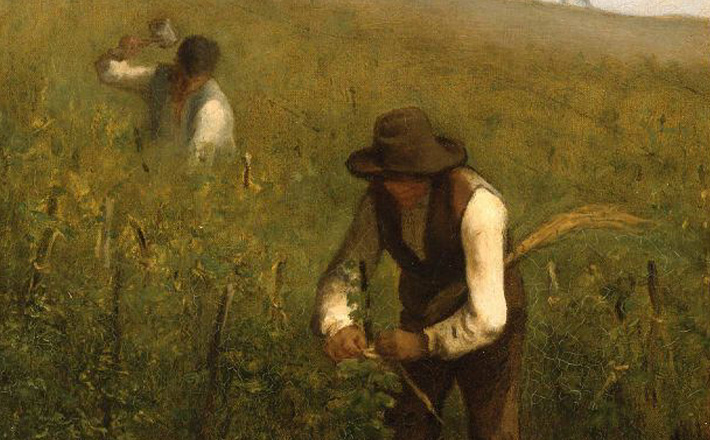Commentary on Isaiah 5:1-7
For the second Sunday in a row, the lectionary features a poetic text from Isaiah with a strong emphasis on social justice.
Isaiah 1:10-20 made the case that God values justice as much as, if not more than, worship. Now, Isaiah 5:1-7 suggests that the establishment of a just society was the single desired outcome of God’s relationship with Israel and Judah. By failing to achieve this, they have both angered and grieved God.
Among modern interpreters, Isaiah 5:1-7 is highly regarded for its literary sophistication. It lacks a title in the text, but it is often called the “Song of the Vineyard.” Frequent shifts in speaker and perspective keep the audience disoriented through much of the poem. At the same time, the pronounced emotional content, the carefully developed central metaphor, and the striking wordplays in v. 7 contribute to its power.
My beloved had a vineyard
In v. 1, the prophetic speaker declares that he is singing a love-song on behalf of his “beloved.” It is not clear who the beloved is, or whether the speaker claims the love-song as his own (New Revised Standard Version “my love-song”) or attributes it to the beloved (New Jewish Publication Society “a song of my lover”). Matters become somewhat clearer in v. 2. The beloved turns out to be a vineyard owner, who spared no labor or expense to ensure the productiveness of his vineyard. Despite his efforts, it produced inedible grapes. Verse 3 introduces another shift, as the vintner now speaks in the first-person (“me and my vineyard”). Despite the absurdity of bringing a lawsuit against a vineyard — although it is no more absurd than singing a love-song about one! — he convincingly argues that he bears no responsibility in the vineyard’s poor production (v. 4) and is within his rights to destroy it (vv. 5-6). By now, the audience must be thoroughly confused.
Verse 7 resolves much of the tension. The vineyard owner is God, and the vineyard is the kingdoms of Israel and Judah. The bountiful harvest for which God hoped was a just society, but the inedible grapes that God received instead are violence and oppression. In one of the most celebrated wordplays in biblical poetry, the Hebrew words for “justice” and “righteousness” are mishpat and tsedaqah, while the words for “bloodshed” and “cry” (NRSV) are mispakh and tse‘aqah. It is difficult to recreate the wordplay in another language, but the New Jewish Publication Society translation captures something of the effect:
He hoped for justice,
But behold, injustice;
For equity,
But behold, iniquity!
The similar sounds of the respective ironically underscore how different their meanings are. While the wordplay provides an artistically satisfying conclusion, it also heightens the sense of disappointment described in the poem. This final disappointment, compounded by the confusing shifts throughout the poem, mirrors the frustration felt by the vintner/God within the poem.1
Justice and righteousness
Although Isaiah 5:1-7 is concerned with the absence of justice and righteousness, the poem offers no explanation of these concepts. It assumes that its audience already understands them. A contemporary audience may need additional background to appreciate the claims of the text. Hebrew mishpat has a broader range of meanings than English “justice.” Both primarily denote the decrees or decisions of a legal system, but “justice” mostly has a negative sense in popular parlance, usually referring to punishments for crimes. By contrast, mishpat may also refer positively to someone’s legal or social entitlement (e.g., “the justice due to the poor” in Exodus 23:6). This meaning corresponds approximately to the idea of social justice. In current usage, “righteousness” typically signifies individual morality. Hebrew tsedaqah sometimes has a similar meaning, but it more often designates the fulfillment of one’s obligations to others. The colloquial phrase “do right by somebody” captures this sense of the word.2
Elsewhere in Isaiah 1–39, mishpat is associated with vulnerable classes of people who are particularly susceptible to exploitation, such as widows, orphans, and the poor (Isaiah 1:17, 23; 10:2). Isaiah condemns the corruption of the legal system (Isaiah 1:23; 10:1) and the unbridled acquisition of wealth and land by a select few (Isaiah 3:14; 5:8). Similar concerns appear in other prophetic texts (Amos 2:6-8; 5:11–12; Micah 2:1-2) and the Torah (Exodus 22:21-27; Leviticus 19:9–10, 15; Deuteronomy 24:10–17). Such texts suggest concrete scenarios that may have informed the condemnation of Israel and Judah in Isaiah 5:7.
An Agricultural God
Although the identity of the vineyard receives the most emphasis in the poem, the representation of God as a vineyard owner is part of the rich, complex portrait of God in the book of Isaiah. The vintner’s careful cultivation of his vineyard is a beautiful picture of God’s care for God’s people. The poem also presents a deity capable of passion and emotion. We sense, and even sympathize with, divine disappointment over human injustice in the anguished questions of the farmer in Isaiah 5:4. The methodical vehemence with which the farmer destroys the vineyard is shocking.
Elsewhere, Isaiah compares God to other kinds of human laborers, such as a silversmith (Isaiah 1:22-25), a beekeeper (Isaiah 7:18-19), or a potter (Isaiah 29:15-16). These blue-collar metaphors suggest divine solidarity with one of the most basic realities of human experience, work. As such, they add depth to expressions of concern for the plight of oppressed workers in Isaiah. Such connections could make this text especially meaningful for members of rural or predominantly working-class congregations.
Notes:
1 Gary Roye Williams, “Frustrated Expectations in Isaiah v 1–7: A Literary Interpretation,” Vetus Testamentum 35 (1985): 459–65. Other aspects of Williams’s interpretation are less convincing.
2 See further the discussion in Rolf A. Jacobson, “‘The Lord is a God of Justice’ (Isaiah 30:8): The Prophetic Insistence on Justice in Social Context,” Word & World 30 (2010): 125–34; James L. Mays, “Justice: Perspectives from the Prophetic Tradition,” Interpretation 37 (1983): 5–17.


August 14, 2016